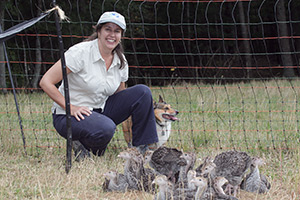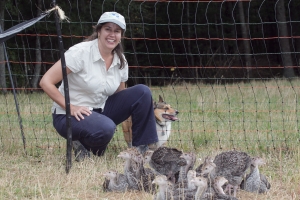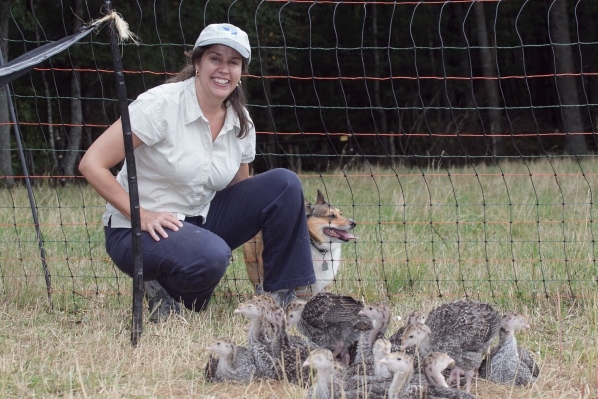 BOONE—Helping former soldiers transition to farming to help meet the nation's food system needs is a goal of the U.S. Department of Agriculture, and Appalachian State University is part of that effort.
BOONE—Helping former soldiers transition to farming to help meet the nation's food system needs is a goal of the U.S. Department of Agriculture, and Appalachian State University is part of that effort.
Photo Caption: Assistant Professor Anne Fanatico has received a USDA NIFA Beginning Farmer and Rancher Development Program grant as a collaborator with the University of Arkansas. She will use the funding to create online modules related to integrating pastured poultry farming into grazing animal operations for small farmers. Fanatico teaches in Appalachian State University’s Goodnight Family Sustainable Development Department. (Photo by Marie Freeman)
Anne Fanatico, an assistant professor in the Goodnight Family Sustainable Development Department has received a USDA NIFA Beginning Farmer and Rancher Development Program grant as a collaborator with the University of Arkansas. Fanatico will use the funding to create online modules related to integrating pastured poultry farming into grazing animal operations for small farmers.
"We need more farmers as we develop the nation's local food system," Fanatico said. "That's been an issue for years. We have so few farmers left and the ones who are left are aging." According to a 2012 census conducted by the USDA, in 2012, the average age of principal farm operators was 58.3 years. According to the American Farm Bureau Federation, farm and ranch families comprise just 2 percent of the U.S. population.
Fanatico is a former Peace Corps volunteer who worked with a nonprofit sustainable agriculture organization in the Ozarks before becoming a university professor.
"A lot of veterans happen to be from rural areas in the South. When they return from active service, many are looking for ways to reintegrate into civilian life," she said. "Veterans bring many life skills to the farm. They are ready for hard work and have the discipline needed to care for crops and livestock. They also tend to be mature and responsible, which is important when facing challenges inherent in agriculture."
Fanatico added that the work may help many veterans deal with issues they have after being in combat.
Fanatico's training modules will focus on sustainable livestock and how to integrate free-range poultry into grazing animal operations. "It can be hard for pastured poultry to be a stand-alone enterprise because of the amount of land needed to support the operation," she said. "So farmers integrate it with animals that graze, such as cattle, sheep or goats. That's important for mountainous areas where it's hard to do row cropping."
Fanatico covers related topics with her students at Appalachian, teaching courses in sustainable agriculture, sustainable livestock, farm business management and applied farming operations. But she says the returning veteran might not need a four-year degree to enter farming.
So far, more than 28,000 people have accessed an earlier online training for beginning farmers series offered through the University of Arkansas.
Other components of the USDA program are mentoring and internships with other veterans already involved in agriculture, she said.
"I'm interested in the ecological aspect of the project, but also the economic viability," Fanatico said. "We need to see these young farmers establish successful enterprises and stay in business."

